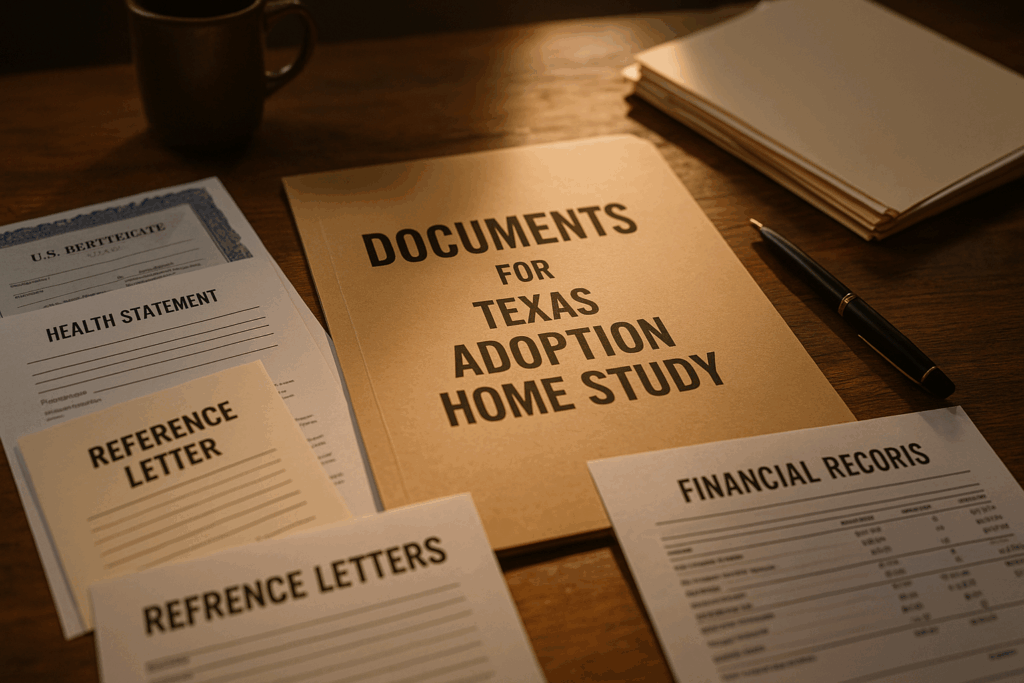
Have you ever cleaned your entire house just because guests were coming over—only to realize you forgot the most important thing: hiding the laundry pile on the couch? Preparing for adoption can feel a lot like that. There’s excitement, nerves, paperwork, and yes, someone inspecting your home with a very official-looking clipboard. Welcome to one of the most important steps in the adoption journey: the components of a Texas adoption home study.
If you’re thinking about growing your family through adoption, this blog is for you. In plain English, we’re going to break down what a Texas adoption home study actually involves—what social workers look for, what documents you’ll need, and how to avoid common roadblocks that slow families down. The short answer? A home study is how the state makes sure you’re ready to provide a safe, stable, and loving environment for a child. But the longer answer? That’s where things get interesting—and sometimes emotional.
Keep reading to find out why this step matters so much, how to prepare like a pro, and how The Law Office of Bryan Fagan, PLLC can help you every step of the way. We’re not just here to help you tick boxes—we’re here to help you protect your future, build your family, and navigate the process with confidence. Let’s dive in.
Key Takeaways for a Successful Texas Adoption Home Study
- An adoption home study in Texas is essential for assessing the suitability of prospective adoptive parents, including document review, home visits, and family interviews.
- Key requirements for the home study include financial documentation, health assessments, background checks for all adult household members, and completion of training on adoptive parenting.
- The Law Office of Bryan Fagan, PLLC provides specialized legal support to navigate adoption challenges, ensuring compliance with legal requirements and readiness for the home study process.

Your Adoption Journey Starts Here
Don’t navigate the adoption process alone. Schedule a consultation today and receive the expert guidance and support you need to build the family of your dreams.
What is an Adoption Home Study?
An adoption home study is a vital part of the adoption process in Texas, and understanding the components of a Texas adoption home study can help families feel more prepared and confident. As our attorneys often explain to clients, this step is not just a bureaucratic hurdle—it’s a thorough evaluation meant to ensure that a child will be placed in a safe, stable, and loving home. Required by Texas Family Code §§ 162.003–162.208, the home study must be completed and approved before an adoption can be finalized.
The process is usually initiated through a licensed adoption agency. A qualified social worker will conduct interviews with all household members, inspect the living environment, and review critical documents such as health statements, financial records, background checks, and personal references. These elements work together to form a holistic picture of the adoptive family’s readiness and ability to care for a child, in accordance with Texas law.
In addition to meeting legal standards, families should understand what to expect and how to best prepare. Our team recommends reviewing this in-depth guide to Texas adoption home studies, which explains the process in detail. It’s also helpful to follow a home study checklist and seek legal counsel early to address any red flags before they delay your adoption timeline.
At The Law Office of Bryan Fagan, PLLC, we’re here to make sure your adoption experience is as smooth and successful as possible. Whether you’re preparing for a private adoption or navigating a foster-to-adopt case, our attorneys are committed to providing practical legal guidance and compassionate support every step of the way.

Required Documentation for Texas Adoption Home Study
When preparing for adoption, gathering the right documentation is one of the most critical components of a Texas adoption home study. These documents serve as the foundation of the evaluation, helping licensed professionals assess whether prospective parents are ready—both emotionally and practically—to provide a safe, stable home. Under Texas Family Code § 162.003, these requirements are not only recommended—they are mandatory for any adoption to proceed legally in the state of Texas.
Adoptive parents will need to provide official records such as birth certificates, marriage licenses (if applicable), tax returns, and current pay stubs to demonstrate identity and financial capability. Health statements for all household members and detailed background checks—often covering the last 10 years of residential history—are also required to rule out any risks to the child’s safety or well-being.
Additionally, strong reference letters play a valuable role. These should come from non-relatives who can speak to the adoptive parents’ character, parenting readiness, and ability to provide a nurturing environment. Collecting and organizing this information early in the process can help avoid delays and demonstrate your preparedness during the home study evaluation.
For a helpful breakdown of what to include and how to stay organized, take a look at our Texas adoption answers home study checklist. If you’re looking to learn more about timelines, you might also find value in our article on the Texas adoption process and legal steps. According to the attorneys at our firm, being proactive about your documentation is one of the best ways to ensure your adoption journey stays on track.

Fingerprinting and Criminal Background Checks
Fingerprinting and criminal background checks for all adult household members are crucial in the Texas adoption home study. Required by the Texas Family Code, this step ensures the child’s safety. Adults aged 14 and older must undergo both state and federal criminal history checks and fingerprinting.
Child abuse clearances are also needed from every state or country where an adult household member has lived in the past five years. For international adoptions, clearances from all locations lived in since turning 18 are required.
Background checks must be updated annually during the adoption process to ensure current and accurate records, including federal background checks, federal criminal background checks, a criminal background check, and background check forms. This thorough vetting creates a safe and secure environment for the child.
Home Inspection Criteria
A home inspection is one of the most vital components of a Texas adoption home study, serving as a safeguard to ensure the living environment is both safe and appropriate for a child. As outlined in Texas Family Code § 162.003, the state mandates that adoptive homes meet specific health and safety standards before a placement can occur. This portion of the home study typically involves a combination of document review and an in-person visit by a licensed social worker to assess the physical home and observe household dynamics.
During the inspection, the evaluator will look for key safety features including working smoke and carbon monoxide detectors, childproofed outlets, securely stored medications or cleaning supplies, and functioning safety gates for stairs if applicable. The layout, cleanliness, and overall condition of the home will also be considered. Each child must have their own designated sleeping area, and photos of both the interior and exterior are often required. Families with pets should ensure their animals are well-behaved and not a risk to a young child’s safety.
The social worker’s visit isn’t just a checklist walk-through—it’s also a chance to meet and talk with each family member. These conversations help the evaluator better understand the family dynamic, parenting approach, and emotional readiness to welcome a child. It’s a holistic review that focuses on ensuring a secure, nurturing environment in alignment with the child’s best interests.
To help families prepare with confidence, our team recommends visiting our Texas Adoption FAQs page for quick answers to common concerns about home inspections and more. You can also explore our adoption process overview for guidance on timelines, legal steps, and what to expect throughout your journey. According to the attorneys at our firm, proactive preparation and honest communication with your social worker are key to a successful home study experience.

Family Interviews and Dynamics
Family interviews are essential in the adoption home study, offering deep insights into family dynamics and readiness for adoption. Individual sessions with each adoptive parent and children over four, along with joint interviews with parents and other family members, help the social worker understand the family’s motivations for adoption, parenting styles, overall family life, and the needs of adoptive families.
Parenting philosophy, support systems, and motivations for adopting are evaluated to ensure the family is ready for adoption’s challenges and joys. Open communication with the evaluator fosters honest dialogue about the family’s readiness and any potential concerns.
The interviews aim to ensure the prospective adoptive families can offer a nurturing and stable environment for the new family member. Insights from these sessions significantly influence the overall assessment.
Financial Stability and Health Assessments
Showing financial assistance and overall health is crucial in the adoption home study. Prospective parents must provide tax returns, pay stubs, and letters from employers to demonstrate financial readiness to support a child.
Medical records for all household members, including health conditions, are required documents. Financial documents and health assessments are vital for creating a supportive and safe environment, ensuring a stable and healthy home for the child’s well-being.
Personal References and Employment Verification
Personal references and employment verification are key parts of the evaluation. Prospective parents must provide references from non-family members, offering insights into their character and parenting ability.
Agencies may request additional documents and statements from references to further assess suitability. Most agencies may request employment verification, along with marriage certificates or divorce decrees, to give a comprehensive view of the applicants’ stability and readiness.
Training Requirements for Adoptive Parents
As our family law team often advises, training is one of the most essential yet sometimes overlooked components of a Texas adoption home study. In accordance with Texas Family Code § 162.007, prospective adoptive parents must demonstrate that they are equipped to meet the emotional, physical, and developmental needs of a child—particularly if that child has experienced trauma, neglect, or significant life disruption. Training is not just a checkbox; it’s a vital preparation tool that helps families build the foundation for a successful adoption.
Many agencies require pre-adoption coursework in areas such as trauma-informed care, adoptive parenting, attachment theory, and behavioral support. These programs help parents recognize and respond to signs of grief, anxiety, or emotional stress that adopted children may exhibit. Training also fosters greater awareness of how adoption impacts identity formation and family dynamics over time. Parents who take this step seriously show evaluators—and more importantly, their future children—that they are committed to creating a compassionate and supportive environment.
These training sessions are designed to be practical and accessible, offering tools and frameworks parents can begin using right away. From managing transitions to establishing trust, the knowledge gained through these programs often becomes the cornerstone of a healthy parent-child relationship. Completing the required hours not only satisfies agency or court guidelines but reinforces the family’s emotional readiness for adoption.
To better understand what happens after your home study and placement, we recommend exploring our detailed guide on Texas post-adoption requirements. If you’re just getting started, our adoption process breakdown is a great place to begin. According to the attorneys at our firm, investing time in training is one of the clearest ways parents can demonstrate their dedication to providing a lasting, stable home.

Tips for a Successful Home Study
Navigating the home study process can be daunting, but several tips can help. Completing paperwork and reviewing documents ahead of time smoothens the process. Testimonials from families indicate that organized document preparation leads to quicker court approvals.
Honesty with the adoption specialist and responsiveness to feedback maintain transparency. Discussing your reasons for adoption provides valuable context and helps build a strong relationship with the social worker.
To prepare for adoption:
- Openly discuss challenges with your social worker to forge a supportive relationship, so you can feel confident.
- Involve family and friends in adoption discussions to build a support network.
- Practice mock interviews to ease nerves before the actual interview.

How The Law Office of Bryan Fagan, PLLC Can Help
According to the attorneys at our firm, legal guidance during the adoption process isn’t just helpful—it’s essential, especially when navigating complex issues like consent, termination of parental rights, or locating an absent biological parent. These are often sensitive legal matters that can delay or derail an otherwise hopeful adoption. As part of the components of a Texas adoption home study, demonstrating legal clarity and preparedness plays a major role in achieving a smooth transition from prospective to permanent parenthood, as outlined in Texas Family Code §§ 162.001–162.208.
Our attorneys have successfully helped families across Texas overcome these challenges by creating adoption strategies tailored to their unique circumstances. From military families dealing with deployment to stepparents seeking legal recognition of their role, we’ve seen firsthand how professional support can reduce stress and accelerate results. You can explore one of these paths in more detail through our post on military adoption in Texas, which covers special considerations for service members building their families.
Clients often share that our help gave them the clarity they needed during one of life’s most emotional journeys. Legal representation during the adoption process helps ensure that all state-mandated requirements are met, especially those tied to the home study process—such as clearances, documentation, and eligibility assessments—so that nothing stands between a family and the child they’re ready to welcome home.
Whether you’re exploring private, foster, kinship, or military adoption, our team is ready to walk you through every step. Learn more about how we help families prepare in our blog on how to adopt a child in Texas. The Law Office of Bryan Fagan, PLLC is committed to protecting your future and making sure your adoption journey honors the best interests of your child—regardless of home size, income level, or family makeup.
Conclusion:
Adoption isn’t just a legal process—it’s the beginning of a lifelong journey filled with growth, love, and yes, a few growing pains along the way. But knowing what to expect and how to prepare for the components of a Texas adoption home study can turn something overwhelming into something empowering. You’ve already taken the first step by learning what this process involves, and that’s no small thing.
If you’re feeling a mix of excitement and nervous energy right now, that’s completely normal. We’ve worked with countless families who were in your shoes—wondering if their home was “ready,” if their paperwork was “enough,” or if their past might hold them back. With the right guidance and support, those families didn’t just meet the requirements—they thrived.
So here’s your next move: Let’s talk. Whether you’re still weighing your options or ready to get started, the team at The Law Office of Bryan Fagan, PLLC is here to help you navigate every legal twist and turn with confidence. Schedule a free consultation today at bryanfagan.com or call us at 281-810-9760.
And hey, as you think about this next chapter, just remember: families are built with love, not perfection. Let’s make yours official—together.
Texas Adoption Home Study: Frequently Asked Questions
A home study in Texas includes background checks, fingerprinting, home inspections, financial and health documentation, personal interviews, and reference checks. It’s a comprehensive evaluation to ensure the family can provide a safe, loving, and stable environment for a child.
An adoption home study consists of document collection (like income and health records), safety inspections of the home, criminal background checks for all adult household members, and personal interviews with each family member to assess readiness for adoption.
Social workers may ask about your reasons for adopting, your parenting style, your childhood and family history, your relationship with your partner (if applicable), financial stability, daily routines, and how you plan to support the child emotionally and physically.
The 7 core issues in adoption are loss, rejection, guilt/shame, grief, identity, intimacy, and control. These affect all members of the adoption triad (birth parents, adoptive parents, and adoptees) and are important to understand when navigating adoption.
To prepare, ensure your home is clean, safe, and child-friendly. Install smoke detectors, lock up hazardous materials, prepare a designated sleeping area, and gather required documents like pay stubs, medical records, and references. Practice answering potential interview questions.
In Texas, a home study is generally valid for 12 months. If the adoption has not been finalized within that time, an updated home study may be required before proceeding further.
An example might include a report detailing a couple’s employment history, financial standing, parenting philosophy, relationship stability, and results of interviews and home inspections. The document concludes with a recommendation on their readiness to adopt.
In most cases, no. Even in private adoptions, Texas law requires a home study to ensure the child’s safety and well-being. The only exceptions may involve close relative or stepparent adoptions, which sometimes allow for waivers under specific conditions.
During stepparent adoption, you may be asked about your relationship with the child, your parenting role, the child’s relationship with their biological parent, the family’s living situation, support systems, and your reasons for pursuing legal adoption.
Bryan Fagan is a Texas family law attorney with a heart for adoption—inspired not just by his legal career, but by his own family story. Growing up in Atascocita with two adopted brothers, Bryan learned early the profound meaning of chosen family. His passion for justice was sparked by John Grisham’s The Pelican Brief, and he became the first lawyer in his family, balancing night classes at South Texas College of Law while caring for his grandmother with Alzheimer’s.
Today, Bryan brings that same dedication to his practice, guiding families through adoptions, custody disputes, divorces, and complex marital agreements. A certified member of the College of the State Bar of Texas, he combines elite legal expertise with genuine empathy—drawing from his roles as a husband, father of three, and advocate for families facing false CPS allegations.
Based in Houston, Bryan is actively involved in the Houston Bar Association’s Family Law Sector and statewide family law organizations. Whether finalizing an adoption or protecting parental rights, he believes the law should reflect the deepest values of home, commitment, and love.

